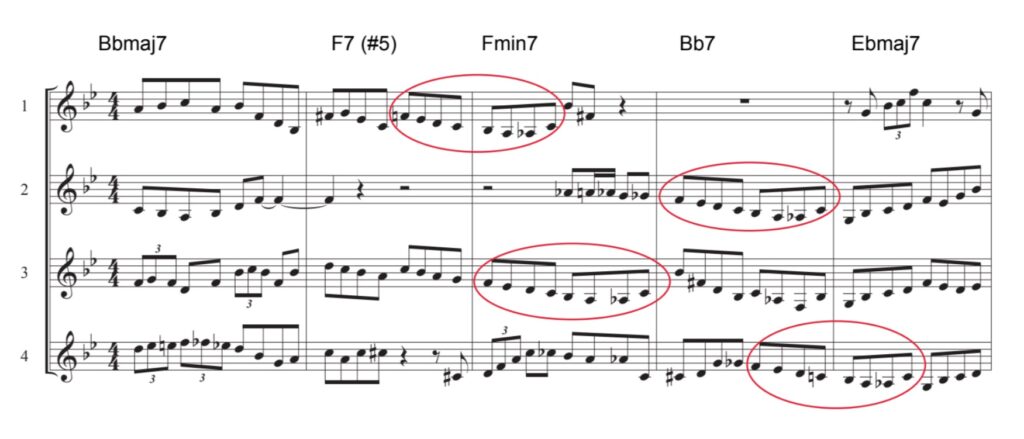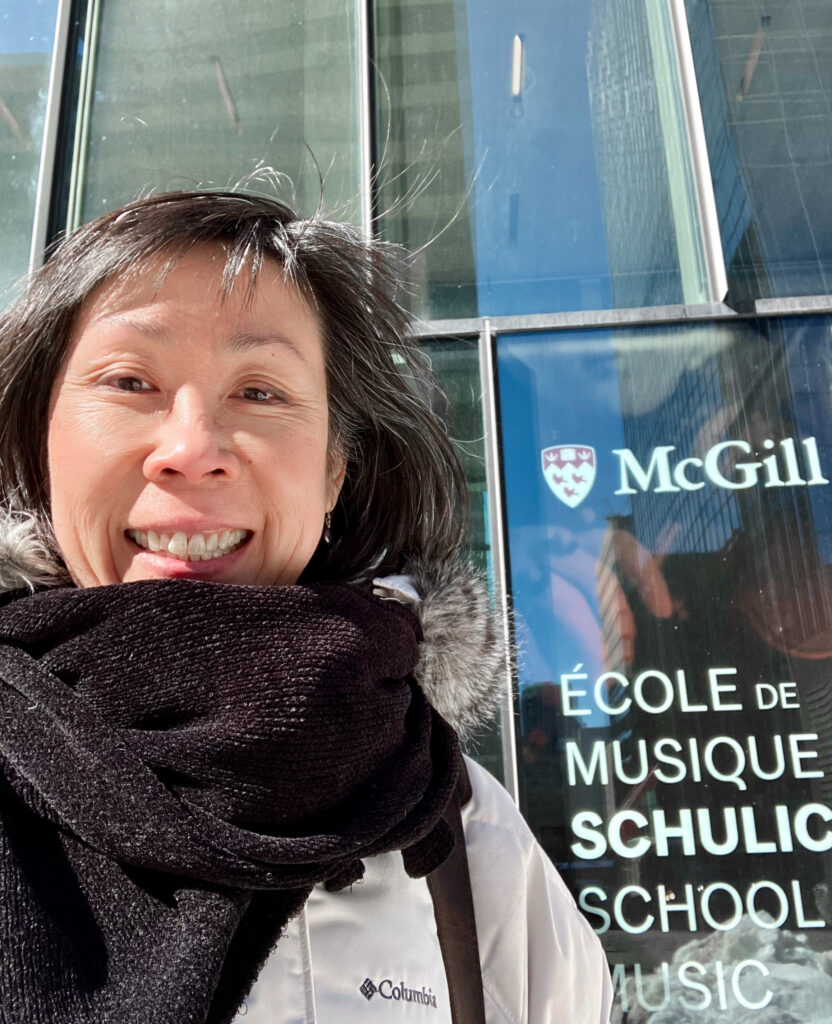Bebop saxophonist Charlie Parker is one of the central architects of modern jazz. His improvisations provided a blueprint for virtually all subsequent jazz soloists. His improvised solos create a kind of musical magic—they are dazzling, virtuosic, and created a lingua franca for modern jazz.
One of the earliest scholarly treatments of Parker’s solos comes from a 1974 dissertation by Thomas Owens. Owens catalogued Parker’s improvisational formulas—that is, the melodic ideas that return frequently in Parker’s recorded solos. Owens’s catalog suggests a finite number of improvisational ideas, often employed and reused in different solos.
But is there a tension here? How is it that Parker’s solos sound consistently fresh and inventive if they recycle much of the same melodic material? We would argue that Parker’s vocabulary is in some ways limited, but the freedom in which he deploys that vocabulary accounts for the appearance of tremendous freedom and spontaneity.
To show an example of how Parker freely restates these formulas, we track one of them. It relies on the same exact notes, but its rhythmic identity shifts. The first audio clip isolates and repeats the idea, first at tempo, then repeats it at a slower tempo, each time gradually accelerated so you can become acquainted with it.
The second audio clip corresponds to four instances of this idea. These are transcribed from Parker’s groundbreaking 1945 solo on the tune “Ko Ko,” Parker’s first recording session as a leader. This idea, circled in red in the example, is typically embedded in a longer melodic line. The first two versions (staves 1 and 2) are heard during the solo’s 1st chorus, while staves 3 and 4 are heard from the second chorus. The second audio clip includes each in turn. There’s a note-to-note relationship between all four, but each statement unfolds with a different relation to the rhythm (and the underlying chords).

Magic is a useful metaphor for Parker. Just like our astonishment of watching a magic trick, we suspend disbelief listening to a great solo of Parker. It sounds like Parker is creating and weaving new lines and melodies together spontaneously. But like a magic trick, this is illusory. Parker frequently combines the same melodic ideas; the incredible tempos and virtuosity intensify the effect. Coming to terms with what is deceiving our ears, i.e., the magic of Parker’s improvisations, allows us to hear Parker’s use and reuse of melodic ideas in flexible ways.
–Keith Waters with Brian Levy
Department News
A Decade of Alumni Accomplishments
Andres Orco-Zerpa (DMA Jazz and Theory Certificate, May 2023)
- Will begin Ph.D. in Music Theory at Yale University with full fellowship, Fall 2024
Devin Guerrero (MM Music Theory, May 2021)
Ph.D. candidate, Music Theory, Texas Tech University
- 2023 Texas Society for Music Theory Colvin Outstanding Student Paper Award for “Pitch, Motive, and Non-Alignment in the Idiomatic Phrasing of Melodic Rap Verses”
Jacob Eichhorn (MM Music Theory, May 2019; DMA Clarinet, May 2020)
Ph.D. student, Music Theory, Eastman School of Music
- 2023 Music Theory Southeast Irna Priore Prize for Student Research for “‘Here is where I’ll end it’: Formal Incompleteness and Death in Popular Song”
- Research Competition prize winner, 2022 International Clarinet Association conference
Landon Morrison (MM Music Theory, May 2013)
Ph.D. Music Theory, McGill University
- Assistant Professor of Music Theory, Eastman School of Music (2024 – present)
- European Research Council grant for research on digital music instrument design, Imperial College London (2023-24)
- Harvard University Post-Doctoral Fellow (2019-21), Lecturer (2021-23), Director of Undergraduate Studies (2022-23)
- Society for Music Theory Emerging Scholar Award for “Encoding Post-Spectral Sound: Kaija Saariaho’s Early Electronic Music at IRCAM, 1982–87,” Music Theory Online 27, No. 3 (2021)
Alan Reese (MM Music Theory, May 2013)
Ph.D. Music Theory, Eastman School of Music
- Lecturer, Music Theory, University of Massachusetts at Amherst
- Visiting Assistant Professor of Music, Wake Forest University
- Instructor, Music Theory, Cleveland Institute of Music
Micheal Sebulsky (MM Music Theory, May 2017)
Ph.D. Music Theory, University of Oregon
- Fiske Planetarium Grateful Dead show featured scholar (April 2024)
- Presenter (with three other CU faculty), “Music of the ‘Long’ ’70s: Black Power, Punk, Jambands, and Jewish Soul,” CU on the Weekend (March 2023)
Faculty Activities
Keith Waters’s and Brian Levy’s upcoming book, Learning Jazz Improvisation through Historical Voices: Roles, Rhythms, and Routines, is in press with Oxford University Press. Waters’s duo CD, Night Songs, was released in 2023. In April 2024, Waters and College of Music Advisory Board member David Fulker will be teaching a set of continuing education classes on “Music and Mood from Irving Berlin to Lin-Manuel Miranda” at the Boulder Jewish Community Center.
Yonatan Malin has an article on timing in the performance of klezmer music forthcoming in the journal Analytical Approaches to World Music. He has also been completing a study of klezmer modes together with Daniel Shanahan from Northwestern University; initial results are available on the website “Modes in Klezmer Music.” This year, he has given colloquia at the Eastman School of Music, Michigan State University, and CU Boulder.

Daphne Leong spent the winter term of 2023 as Distinguished Visiting Professor and Schulich Dean’s Chair in Music at McGill University in Montréal, Canada. While there, Leong taught a graduate course, collaborated with McGill faculty and research centers, and organized an international conference Rhythm in Music since 1900 (second edition; the first edition was held at CU-Boulder in 2019). A special issue of Revue musicale, featuring articles and performances curated from the McGill conference, will be published in 2025.
This spring Mark Arnett has been building an online music theory course to expand the college’s connection with the broader campus. For Maymester and Fall course offerings, he’s refining his American Vernacular Music course to broaden students’ engagement with popular styles. And in addition to teaching, he’s composing a collection of piano pieces to release in the near future.
Philip Chang recently accepted the position of reviews editor for the Journal of Music Theory Pedagogy.
Header image by RDNE Stock project (https://www.pexels.com/@rdne/)
